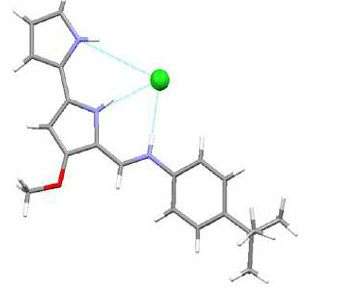A new family of aniontransporters to fight against cancer

The journal Accounts of Chemical Research has published the article "Anion Transporters and Biological Systems", by Professor Ricardo Pérez Tomás, from the Department of Pathology and Experimental Therapy of the Faculty of Medicine at the University of Barcelona, Roberto Quesada, from the Department of Chemistry of the Sciences Faculty at the University of Burgos, and Philip A. Gale, from the University of Southampton, in the United Kingdom.
The research discusses the development of new lipid bilayer transporters of anions—negative ions— that are based on the structure of natural products, such as urea and tambjamines, marine alkaloids which are structurally related to prodiginines. UB's long research tradition on aniontransporters, such as prodiginines, began in the seventies with the work developed by Professor Gaspar Lorén, who carried out a research from a microbiological perspective at the Department of Microbiology of the Faculty of Biology of the UB.
Later, UB research in this field was promoted thanks to the work developed by Professor Ricardo Pérez Tomás on the ability of these compounds —together with other synthetic analogues— to trigger cancer cell apoptosis. According to this research work, pH dysregulation is a perfect storm for the progression of certain types of cancer. Consequently, those molecules which reduce in a selective way intracellular pH would be interesting new chemotherapeutic agents for cancer treatment. Dr Pérez Tomás' research work has had a great scientific impact as it proves that higher anion transport ability also determines a more effective anticancer activity. This aspects plays a key role in researching on new anticancer agents, and in particular, in describing the relationship of aniontransport properties of molecules and their toxicity on human cells of small cell lung cancer —one of the most aggressive cancers— and melanoma cells.
The journal Accounts of Chemical Research, which has a profound impact on Chemistry and other related sciences, publishes on its current issue the article "Anion Transporters and Biological Systems", signed by Professor Ricardo Pérez Tomás, from the Department of Pathology and Experimental Therapy of the Faculty of Medicine at the Bellvitge Health Sciences Campus, Roberto Quesada, from the Department of Chemistry of the Sciences Faculty at the University of Burgos, and Philip A. Gale, from the University of Southampton, in the United Kingdom.
The research discusses the development of new lipid bilayer transporters of anions—negative ions— that are based on the structure of natural products, such as urea and tambjamines, marine alkaloids which are structurally related to prodiginines. UB long research tradition on aniontransporters, such as prodiginines, began in the seventies with the work developed by Professor Gaspar Lorén, who carried out a research from a microbiological perspective at the Department of Microbiology of the Faculty of Biology of the UB.
Later, UB research on this field was promoted thanks to the work developed by Professor Ricardo Pérez Tomás on the ability of these compounds —together with other synthetic analogues— to trigger cancer cell apoptosis. According to this research work, pH dysregulation is a perfect storm for the progression of certain types of cancer. Consequently, those molecules which reduce in a selective way intracellular pH would be interesting new chemotherapeutic agents for cancer treatment. Dr Pérez Tomás' research work has had a great scientific impact as it proves that higher anion transport ability also determines a more effective anticancer activity. This aspects plays a key role in researching on new anticancer agents, and in particular, in describing the relationship of aniontransport properties of molecules and their toxicity on human cells of small cell lung cancer —one of the most aggressive cancers— and melanoma cells.
More information: Gale, P. et al. Anion transporters and biological Systems, Accounts of Chemical Research, April 2013. DOI: 10.1021/ar400019p
Provided by University of Barcelona

















